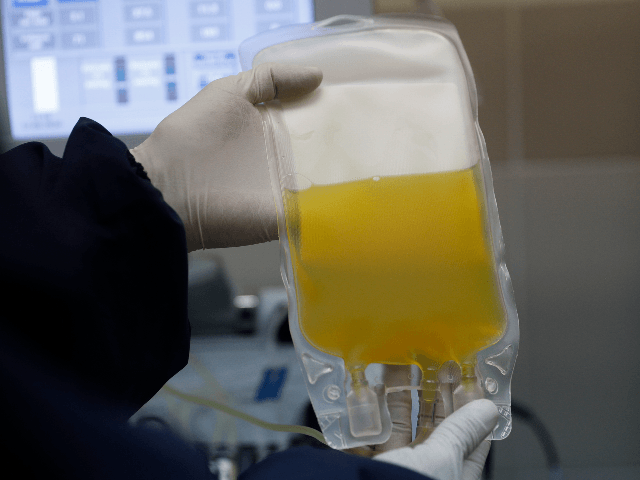A lawmaker in Buenos Aires province, Argentina – where the nation’s capital is located – presented a bill on Monday that would require individuals to opt out of donating blood plasma if they are diagnosed with Chinese coronavirus and survive the infection.
The details of the law, introduced by state deputy Daniel Lipovetzky, appear to be less severe than his initial proposal on Twitter, where he announced this weekend he would present a law to make plasma donations “obligatory” – prompting a wave of outrage from users fearing that the state would usurp their bodily autonomy.
Scientists around the world are experimenting with the use of blood plasma to help coronavirus patients recover. In people who have endured and survived an infection, plasma carries key antibodies created in response to the virus – antibodies that have already defeated the virus at least once. Plasma therapy presumes that introducing the antibodies one person created into the blood of someone currently fighting the virus can help them recover. It is not yet considered a guaranteed cure.
Argentina is currently governed by a socialist president, Alberto Fernández, and vice president and former president herself Cristina Fernández de Kirchner (no relation). Fernández de Kirchner is most prominently known outside of Argentina for being indicted, but exonerated, for making under-the-table deals to protect Hezbollah terrorists. Lipovetsky, however, is a member of the center-right political party Together for Change.
Lipovetsky posted on Twitter on Saturday that he had prepared a bill for “obligatory” plasma donation in response to Argentine journalist Fernando Bercovich pondering out loud, “is it bad to think that that plasma donation should be obligatory from people who recover?”
“Not at all bad, Fernando,” Lipovetsky replied. “This Monday I will present a bill in the provincial Chamber of Deputies [Buenos Aires state legislature], which I just finished drafting, establishing, during the emergency, the mandatory nature of at least one plasma donation from people who have recovered over 18 and under 60 years old.”
According to the Argentine outlet Infobae, Lipovetzky later added that mandatory plasma donations “are a moral commitment to surpass ten percent donations as we currently have in Buenos Aires province.”
The declaration triggered alarm and confusion on Twitter, particularly from the Argentine right. Prominent Libertarian economist Javier Milei responded to news of the bill by reporting that a mandatory donation “IS NOT A DONATION.” A follower replied, “In Argentina, they want to expropriate blood! There’s nothing left to loot and now they want our blood, madness.”
Infobae noted other outraged conservatives responding to the measure asking, “aren’t you guys the ‘my body, my choice’ people?” apparently in reference to support for abortion.
The actual bill Lipovetzky presented to the state legislature did not include any provisions to mandate blood donations, perhaps a response to the outrage the lawmaker’s initial remarks caused. Instead, his law would mirror provisions in place on organ donation: if a patient does not opt out of plasma donation, they will be listed as donors if they become sick and recover from the Chinese coronavirus.
“Of course it won’t be mandatory,” Lipovetzky told a local radio station on Monday.
In another interview, however, Lipovetzky admitted that his bill “goes beyond the strictly voluntary but it is not compulsory donation. If you do not express your will not to be a donor, you are a donor.”
“We have to go a little bit beyond the voluntary,” he emphasized.
If the law passes, anyone in Buenos Aires province who tests positive for coronavirus will have their name added to a list of donors. If they opt out of the program, their names will be added to another list of those who did not consent. Those who do not opt out and ignore calls from hospitals to donate will be “sanctioned,” Lipovetzky suggested, without elaborating on how.
“There is no compulsory donation, what we have to debate is if there will be shame or not … there could be an administrative fine, like the one for when you do not vote, an economic sanction,” he noted.
Voting in Argentine elections is mandatory. Those who do not vote must pay a fine.
At press time, Argentina has documented 62,268 cases of Chinese coronavirus nationwide and 1,283 deaths among them. While relatively remote from many of the world’s pandemic hubs, Argentina does border Brazil, one of the most severely affected countries in the world currently fighting the Chinese coronavirus. As it is in the Southern Hemisphere, Argentina is engaging in its fight to contain the virus during winter.

COMMENTS
Please let us know if you're having issues with commenting.